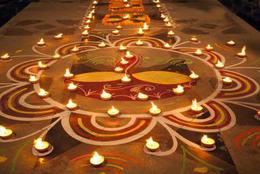 Next week I am hoping to attend the 1st Asian Ministerial Conference on Disaster Risk Reducation in New Delhi, India. The meeting is a follow-up to the global meeting in Sendai last year. I will support the teams from Partners for Resilience from India, Indonesia and The Philippines. The meeting starts rigth after the last day of the Diwali festival, hugely celebrated as I recall from our years in India. Spiritually Diwali signifies the victory of light over darkness, good over evil, knowledge over ignorance, and hope over despair. The timing of the conference could not have been chosen better in that regard as far as the Indian hosts are concerned. I am flying in on October 30, Amavasha, the highlight of Diwali, with new moon. When the moon has completely disappeared and lights are lit over the whole city. Must be an astonishing view from air (if not polluted). Beautiful rangoli art will be decorating floors and doorsteps to welcome Laxmi, the godess of wealth and fortune, into the homes. However, the region is prone to disasters, bring poverty and misfortune to a a lot of homes. The Philippines is just recovering from two massive typhoons. Hence for the Ministers heading Disaster Management departments this meeting offers a good opportunity to compare notes about ways to reduce risks and search for the true diwali light that not only burns for the rich and wealthy but also turns ignorance into knowledge for the marginalized of society living in disaster prone places. Partners for Resilience will be presenting their key-statements in several sessions, highlighting the need to integrate Disaster Risk Reduction, Climate Change Adaptation and Ecosystem Management and Restoration, basically bringing together humanitarian aid, climate and development agenda's. That leads me to point to yet another imporant High Level Meeting soon coming up in Nairobi, following an earlier gathering in Mexico City two years ago. This meeting is co-chaired by the Dutch minister for Aid and Trade, Lilianne Ploumen, emphasizing the need for partnership to achieve all sustainable development goals. An online consultation on a draft outcome document has just started. Will be good to contribute and support these efforts. Anyway, to all my India colleagues I say: Happy Diwali!
0 Comments
While many colleagues were in New York lobbying for new commitments, as program staff we were quite busy with finalizing the inception phase of one of those commitments made in Paris last year on addressing Climate Change to include vulnerable communities in negotiation processes and consider ecosystems while designing solutions. What we developed in the process is a local Dialogue Capacity Framework that contextualizes advocacy or policy influencing. An enlightment based paradigm of what advocacy and policy influencing is all about is quite dominant in the discourse surrounding advocacy programming. Whether an NGO is considered a good watchdog is hard to judge for outsiders. Do you know what it needs to bark on? Asking a dog itself what capacities it requires for 'barking' may sound a bit odd. The question probably is not how to bark but when to bark. This may particularly hold for NGOs that bark all the time, but are not listened to or in the worst case are even put in a kennel. They may no longer be allowed to move freely over the property and snif around in places to trace intruders. So how to strengthen watchdog capacities? What makes a good watchdog? Does its size matter? Or its previous experience with intruders? Or does its relationship to the landlord matter for the energy it puts into protection. If the landlord is not nice to the watchdog, will the dog stay at the compound, or will it run the moment the gate is found open? Writing nice policy briefs (bringing the newspaper from the doorstep to the living room) will be appreciated but is this always required? The strange thing with dogs is, even if the owner does not treat her well it usually stays loyal. It is going to be important to know what behavior a dog shows in the face of change of environment. Exposure to other dogs often triggers more barking then necessary or desired. Maybe it is time for some hunting dogs who cooperate better and are out in the field to drive their prey in the desired direction. In fact, it is interesting to learn about the different roles a dog can have and the website dogscience.org carries a number of important lessons that equally may apply to NGOs that consider themselves watchdogs but are in fact barking dogs. Voilá, your recipe for effective advocacy training! The most important question to ask would probably be: Whose 'dog' are you training? "The role of the watchdog is not to attack intruders. Nor is it to forestall an attack by the same. Nor, is the role of the watchdog to bark at everything he sees. Rather, the proper role of a well trained watchdog is to sound the alarm by barking when he sees someone do one of those specific things that he has been trained to watch for. Your task as someone who is about to train a watchdog is - first - to make a list of those things that you want your watchdog-to-be to bark at and - second - to arrange the training contingencies to ensure that your dog always barks at those things. However, just as importantly, you must ensure that your dog will bark only at those things" |
About meMy name is Reinier van Hoffen. U®Reading
Click here for a summary.
Also find the text of a lecture Dr. Achterhuis held at the 2012 Bilderberg conference. Archives
August 2022
|
AddressNachtegaallaan 26
Ede, the Netherlands |
Telephone+31 (0)6 1429 1569
|
info@uraide.nl
|
 RSS Feed
RSS Feed
















